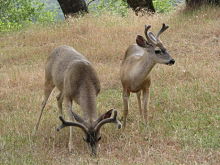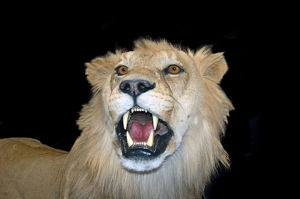Bill McKibben and 350.org Can Magnify and Speed Their Impact
Bill McKibben, leading the international climate campaign 350.org, urged an attentive audience at Natural Products Expo West to make a difference for the future of the planet. Over 5200 demonstrations, which circled the globe in 181 countries on October 24, 2009, show grassroots understanding of the need to reduce atmospheric carbon dioxide to no more than 350 parts per million. The current level of 390 parts per million, rising with no end in sight, spells catastrophe for life on earth as we know it.
The most significant part of the talk was McKibben’s answer to an audience question. One woman asked why 350.org does not include a truly sustainable diet as a critical action item in the campaign. She pointed out that a recent analysis by Worldwatch Institute demonstrates that 51% of greenhouse gases are directly traceable to raising animals for food.

The effect of these native ruminants, in an intact ecosystem, on greenhouse gases is in no way like the impact of cows
The obvious solution to getting at least halfway to the goal of stopping climate change is simple, rapid, and no cost – eat a plant-based diet.
In his response, McKibben acknowledged that factory farming animals is a huge cause of climate change. However, he was not advocating immediate action to change diet. Instead, he advanced the idea that a carbon tax, once enacted, would make factory farmed animals so expensive that meat would be priced out of the range of most people. This would happen because people in the animal foods business would have to pay the “true cost” of their carbon impact.
McKibben also theorized that “grass fed cattle” could actually be helpful in reducing greenhouse gases. The theory is that, as large animals roam and trample vegetation into the soil, the ground itself stores carbon and keeps it from being released into the atmosphere.
This idea stems from the observation that, before humans started large scale environmental destruction, millions of ruminants roamed the earth and the average temperature was cooler. Ruminants are animals with multiple stomachs to efficiently digest their plant food. Bison, deer, antelope, cows, goats, and sheep are all ruminants.
Three significant flaws blemish McKibben’s response to his audience question. First is the timeframe. Passing meaningful legislation to tax carbon emissions will likely take years. The phase-in of the new tax would be years more.
We don’t have time to wait. People can start eating a plant-based diet now. Today. Immediately. No need to wait for stalling politicians protecting powerful industries. We can’t wait for a carbon tax. The danger is too great and climate destabilization is happening as you are reading this.
Second, “grass fed cattle” is no rebuttal to the damage from raising animals for food. Just on a purely cost level, only a few wealthy
people could afford this product when a population of 7 billion people want it. There is just not that much rangeland, and most of the land that cattle can graze is already highly degraded.
In no way are cows, which are a domesticated species, comparable to native wild animals that are part of an intact ecosystem. Bison were an integral part of the great prairie that once blanketed the middle of North America. Deer were inseparable from their forested and open habitat. Big horn sheep were woven into their desert environment.
Then humans introduced cows into these areas, crowding out and killing most of the native animals, wiping out plant species, and in general leaving the ecosystem in tatters. Cows trampling sparse vegetation into a thin layer of soil can not in any way reproduce the effect that buffalo had on the tall, lush grasses and fertile topsoil of the original prairie.
If one tactic to reduce climate change is to sequester more carbon in the soil and living vegetation, the way to accomplish this is to not raise cows. Instead, bring back the native ruminants and their natural predators, the original vegetation and insects and amphibians and all the other species in the web of life.
Of course this task is difficult, but there is no reason to stall by advocating “grass fed cattle.” The cows keep the rangeland from the natural succession of open space to forest. The trees in the forest will keep far more carbon out of the atmosphere than the grass the cows are trampling.
Most subtly but perhaps most importantly, the failure of McKibben and 350.org to advocate an animal-free diet is tied to the worldview that humans are the masters of the planet. For example, the 350.org website suggests people should herd their livestock to spell out 350. This destructive idea is about as good as a suggestion to pour oil into a pristine lake in a 350 pattern.
Raising animals for food distances people for nature instead of showing people as part of an intact web of life encompassing millions of other beings. If this way of relating to nature does not change, the chances of saving life as we know it on this planet are dim.
McKibben and 350.org can significantly speed and enhance their climate impact by rethinking their stance on a plant-based diet. Urging people to plant gardens and insulate their homes is safe and noncontroversial. Advocating a plant-based diet is riskier and could alienate some 350.org members.
Yet an animal-free diet is the only change with the powerful, immediate impact to reverse greenhouse gases now. Without this dietary evolution, all the other strategies are nothing but delaying tactics.
Leaders owe it to all the caring people supporting 350.org to tell them the whole truth about what will save the planet. Then let the people decide what changes they are willing to make to secure their children’s future. If a plant-based diet seems inconvenient or difficult, then imagine how much more painful the alternative is.
350.org is planning a Global Work Party for October 10, 2010. People around the world are signing up to make this date a powerful starting point for concrete action to reach the 350 parts per million goal and spur political leaders to stop talking and start doing. Participants will insulate houses, work on bike paths, install renewal energy sources, and take other effective earth-saving steps.
Yet if people doing great 10/10/10 actions stop for a meat-and-cheese sandwich lunch, they negate the good they have done in the morning. Let’s make 10/10/10 a real turning point. Let’s make it a 100% plant-based day!
Intrigued? Now you can use our Whole Foods Blog Finder to target informative, fun postings on plant-based nutrition. Quick information at no cost!
Blog by Janice Stanger, Ph.D. Janice authored The Perfect Formula Diet, a nutrition book built on sustainable food choices. Enjoy six kinds of whole foods for permanent, hunger-free weight loss and health.
Tags: 350.org, Bill McKibben, Climate change, environmental degradation, global warming, greenhouse gases, Janice Stanger, making a difference now, Natural Products Expo West, Plant-based nutrition, process of change, water pollution, water shortages, whole foods





